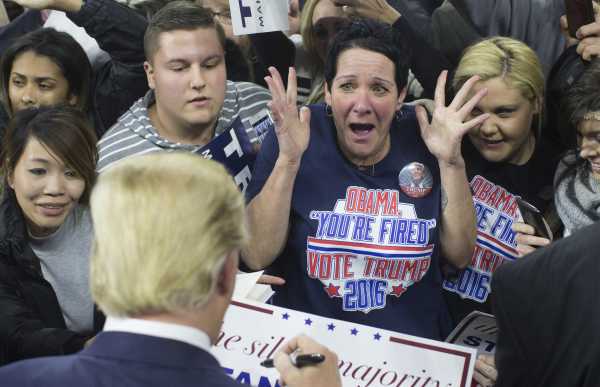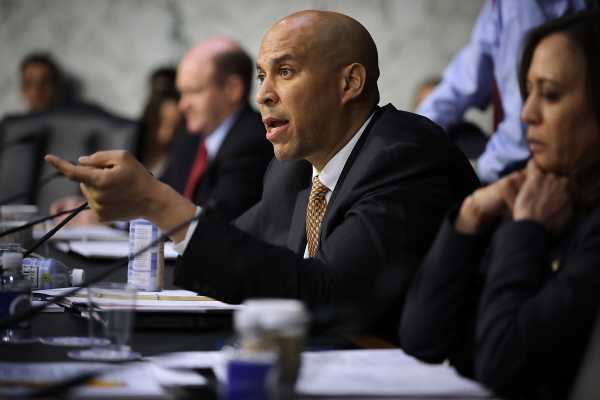
Back before the 2016 election, it was easy to find so-called Never Trump Republicans (NTRs). They were thick on the ground, on every op-ed page and cable news show, raising dire warnings about the threat Donald Trump posed to American democracy. National Review devoted a whole issue to that threat.
Since Trump won, the number of NTRs has dwindled precipitously. (Turns out “never” meant “unless he wins.”) There are virtually no elected Republicans still in the ranks. What remains are mostly thinkers and pundits — Jennifer Rubin, David Frum, Ana Navarro, Bill Kristol — with no formal organization to call their own.
Nonetheless, they are still around, and they still need to figure out what to do with themselves. Who should NTRs vote for? What party should they ally with? How should they use their limited political power?
Last week, the Niskanen Center’s Jerry Taylor, a prominent NTR, wrote a somewhat plaintive piece drawing these questions together: Whither Never Trump?
I would like to propose an answer. And though I acknowledge the substantial social and psychological challenges it would entail, it seems to me, on a moral level at least, pretty obvious. To wit: NTRs should vote Democrat.
Perhaps in races where notably reformist Republicans are running, willing to repudiate Trumpism, they should vote GOP. But for the most part, they should vote D.
I’ll lay out the case below, but the reasoning is not that complicated: There are, for all intents and purposes, two parties contending in the American system. If you believe one of them is an existential threat to that system … you should vote for the other one. Because one of them is going to win.

The GOP is Trump’s now
The first thing to understand is that lots of popular conceptions of Trump — that he’s an anomaly, an aberration, an outsider who’s hijacked and split the party — are just wrong. Taylor cites this recent paper from political scientist Larry Bartels, which shows in great detail that, for all intents and purposes, there is no anti-Trump faction of the GOP. The party is united behind Trump, which is why Congress has provided no meaningful check on his power or corruption.
Similarly, popular conceptions of the GOP — that it is driven primarily by conservative economic principles like small government, low taxes, and deregulation — are also wrong. It turns out those things were the preoccupations of a thin and unrepresentative conservative elite, primarily in DC. The Tea Party uprising and its culmination in Trump were driven by white resentment and white backlash. (Here’s another new study supporting that thesis.) The ethnonationalist populism Trump represents is the dominant strain of conservatism in America today.
That is the ugly place where NTRs must begin: They have lost the party. They command no divisions within it. What used to be called “principled conservatism” — that’s the anomaly.
Here’s Taylor:
There you have it: an existential threat. A party that is not meaningfully restrained by shared norms of conduct cannot long be legally or democratically restrained either. And the GOP has grown more lawless with each passing administration.
It may sound faintly absurd to think that the US could see widespread political violence or openly rigged elections, but lots of things that are currently happening sound faintly absurd too. Norms and expectations that were once considered sacrosanct have dissolved like tissue paper, one after the other. Who’s to say where it could lead?
Which is to say, an existential threat is a serious thing. So what should NTRs do about it?

There are only two parties that matter
Taylor runs through the options for NTRs: starting a third party, sitting out upcoming elections, voting with Dems, and staying in the GOP.
He sees a third party as futile, since history shows that third parties succeed only when a major party collapses, and both parties are quite secure at the moment. Plus there just aren’t that many NTRs. As he says, “Where are these new party members going to come from? Republicans are reasonably happy with Donald Trump, and Democrats are happy with their party leading the #Resistance.”
Sitting things out in exile won’t do much good, since it could take a long time for the parties to realign in any meaningful way.
What about voting Democratic? “Going Democratic is an option,” Taylor says, “but there aren’t enough Never Trump Republicans to really impact where that party is going (Sanders-Warren) and little enthusiasm for their progressive agenda.” (There’s a slip in the argument here. The point of voting Democratic would not be to shape the Democratic policy agenda but to ensure Republican defeat. More on that in a second.)
Having eliminated the alternatives, Taylor concludes that NTRs should stay in the Republican Party and work to reform it. “The GOP will likely stay on its present course until it is decisively defeated in a national election,” he says. “What happens next will depend on whether there are dissidents in the party with a will to fight.”
I think Taylor gets this wrong.
The only way to change a party is to crush it
Taylor acknowledges that changing the GOP from the inside will be a heavy lift, but cites some examples of it happening in the past: thanks to vigorous internal advocacy and organization, the party moved from pro-choice to pro-life, pro-immigration to anti-immigration, pro-safety-net to anti-entitlement.
The problem is, all Taylor’s examples are of the GOP getting more reactionary over time. The sole exception is John McCain supporting cap-and-trade during the 2008 election — an obviously defensive move that everyone in the party dropped like a hot potato the second Barack Obama won. Other than that, Taylor can’t conjure a single example of the party getting less extreme due to internal pressures.

All the momentum on the right is in the same direction, toward white grievance and lawlessness — in other words, in precisely the direction Taylor identifies as an existential threat to American democracy. The party has been beaten along the way (2006, 2008, 2012), but it has not flinched. Conservative elites wrote a whole elaborate plan for reform after the 2012 election, counseling a softening on immigration (ha ha). The party utterly ignored and repudiated it.
I know it is difficult for principled conservatives to see it like this, but the GOP’s devolution toward ethnonationalist populism can be traced all the way back to President Ronald Reagan, or earlier. And though it has zigged and zagged, occasionally paused, it has generally accelerated in the direction of radicalism.
From where we are now sitting, the conflict looks inevitable: America’s dwindling white Protestant majority, facing off against an unwieldy coalition of challengers, increasingly driven to “authoritarian, blood and soil politics” in defense of privilege. As that new study in PNAS puts it, what motivates Trump voters are trends that “threaten white Americans’ sense of dominant group status.”
That battle must play itself out. The GOP will only change when white-grievance politics is consistently rejected at the ballot box, as it is in California. Only if that happens will the party be open to change.
And if the party wants to change, it will seek reformers willing to return home.
That battle could take years, even decades. But by Taylor’s own reckoning, if the blood-and-soil contingent wins, American democracy could be lost. There is only one alternative to that outcome: the other side winning.
Like it or not, there are only two parties that matter in the US. For a Trumpist GOP to lose, the Democratic Party must win. ‘Tis math.
So Taylor should suck it up and vote for Democrats — not because he likes their policies, but because the alternative is an existential threat.

NTRs won’t do that
I doubt Taylor or any other NTR will find this provocation convincing. Campaigning for Democrats would not only nuke most of their existing social and professional relationships, it might make them complicit in such horrors as the passage of universal health care or the raising of the minimum wage — to say nothing of the non-carbon-tax climate policies they might unwittingly usher into existence.
It’s a nasty choice they face, and in many ways an unfair one. It’s difficult to argue many liberals would make the inverse choice if circumstances demanded it. I like to think I wouldn’t vote for a proto-authoritarian pushing a hefty carbon tax, but, y’know, who among us. Tribalism is a hell of a drug.
Luckily, liberals don’t have to worry about that, since, by and large, their tribe is still led by people who value deference to shared democratic norms of conduct and inquiry. Democratic conduct is not uniformly noble, by any stretch of the imagination, nor are Democratic voters devoted solely to principle, but there is nothing close to symmetry, nothing like the galloping radicalism of 21st-century conservatism. (Mitch McConnell is now bragging about denying Supreme Court nominee Merrick Garland a vote, even as he vows to deny a vote on a bill protecting Robert Mueller.)
There are strains of radicalism on the left that must horrify any NTR. And there remain important policy differences between NTRs and even mainstream Dems, to say the least. But on the question of shared democratic norms and their value, the choice between parties has become clear.
Insofar as being an NTR means prizing those norms above more proximate policy goals — and what else could it mean? — NTRs have an obvious answer: They must support the only major party to which those norms still matter. It is not a choice they are likely to make, and I can hardly blame them, but it is clear nonetheless.
Sourse: vox.com






